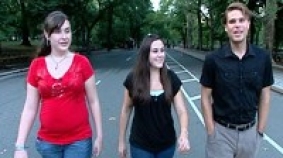
Ryan Kramer is not your average 20 year old. He graduated from high school at 14, has already earned a masters degree in engineering, and this fall will start working at NASA as a rocket scientist.
Ryan Kramer is not a typical 20 year old. He graduated from high school at 14, has already earned a master's degree in engineering and will start working this fall at NASA as a rocket scientist.
But growing up with an incredible intellect wasn't the only thing that made him different from other kids.
"I was told I was donor-conceived at a very young age ... as I got older I became more curious about that half of my DNA," Kramer of Nederland, Colo., said.
With mom Wendy's approval, Kramer set off on a mission to find his sperm-donor dad.
"I didn't need a father ... what I wanted was to just see a picture of him or have a conversation," he said, adding that he was looking for answers more than anything else.
An estimated 35,000 to 60,000 babies of sperm donors are born every year, and a growing number of the children want to meet not only their donor fathers but also their half-brothers and -sisters.
The plotline is playing out across America and on the silver screen, in one of the summer's most critically acclaimed movies, "The Kids Are All Right," starring Annette Benning and Julianne Moore. It follows the lives of two kids who go in search of their sperm-donor father.
Boy's Search for Biological Siblings
Kramer's real-life journey began on "Good Morning America" in 2002 when the 12-year-old read a note he penned to his local sperm bank.
"I would like some information about my father, even a phone number," he said on "GMA."
"I felt it was my responsibility to help him get the answers he was looking for, but there was no where to look, there was no one to help us out," Wendy Kramer said. "That's why we started the DSR [Donor Sibling Registry]."
The Donor Sibling Registry is a website with 30,000 members. It unites donors, their children and their siblings, through identification numbers.
New connections are made everyday, but uniting donor families can be difficult because the federal government provides little oversight. Also, there's no tracking of the number of children a single sperm donor can have, which many men are not aware of when they donate.
"I have donors that come to my site all the time and say, 'Wait a minute, I just came to your website and I see that I have 22 children. How can this be? The sperm bank promised I would have no more than 10,'" Wendy Kramer said.
A Sperm Donor Has More Than 125 Kids
Through her registry, Wendy Kramer said, one donor learned he had more than 125 children, 70 of them younger than 7. The donor is now in contact with them.
"He says it's fine now because basically they are all on an Excel spreadsheet, but 10 years from now when they are 70 teenagers and many of them might feel like Ryan -- they just want to look into the face of the guy they share DNA with -- it's going to get really complicated," Wendy Kramer said.
Donors have no liability, financially or otherwise, but many fathers and grandparents want to know. Still, experts say, most men don't receive adequate counseling before they make a sperm donation.
"If they knew they were going to be contacted, and if they knew more than five children or 10 children would be created, many of them may not choose to donate," said therapist Patricia Mendell, who focuses on donor offspring.
Some sperm banks believe their counseling methods are adequate, although one deposit to a sperm bank can be broken down into eight to 20 vials. If a donor makes dozens of deposits, the numbers of potential offspring are staggering, and tracking successful births is not required.
In addition, only about 40 percent of mothers who give birth to sperm-donor babies actually report it to the bank.
Six Half-Siblings, One Modern Family
After years of searching, Ryan Kramer finally discovered his donor father and developed a good, if slightly distant relationship, bonding over similarities such as an interest in mechanical engineering.
So far, he has established contact with six half-siblings, but said there could be closer to 20 or 30 potential siblings out there.
Two of Kramer's newfound sisters are Kristina and Natalie Pavone, who connected with Kramer on the Donor Sibling Registry. Despite fears at first that they would have nothing in common with a rocket scientist, they learned he was "an awesome guy," and that they were more similar than they had expected.
"There are parts of our personalities that are very similar," Kramer said.
Since meeting last year, the three siblings visit for holidays and big events, and they can't wait to discover more additions to their very modern family.
"The more, the merrier," he said. "Meeting my half sisters has been such a treat."
By KELLY HAGAN
Source: abcnews.go.com






